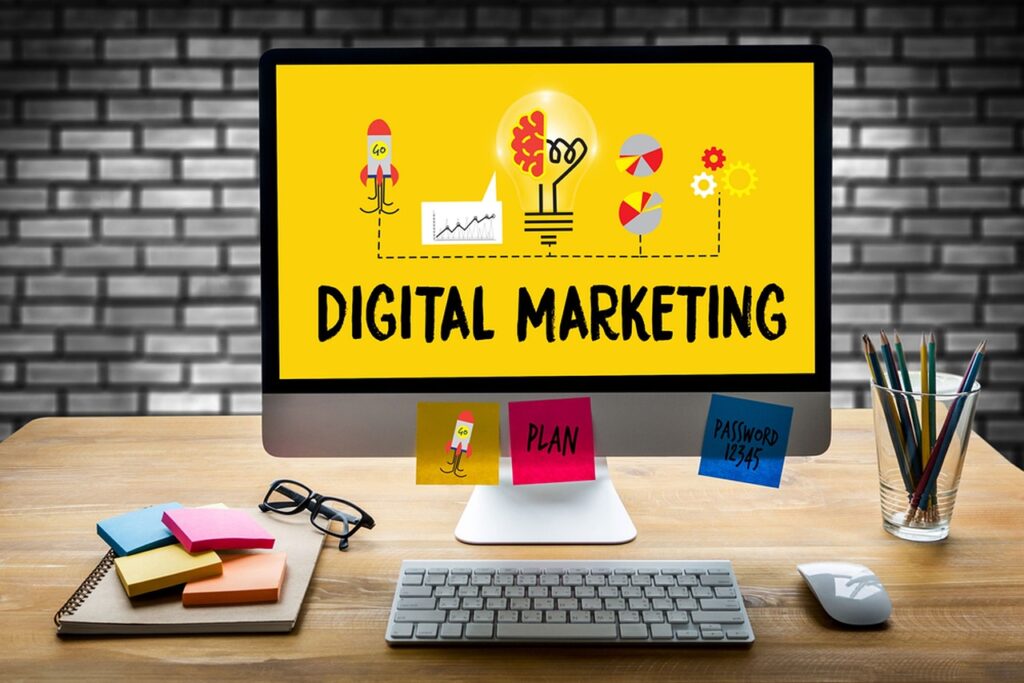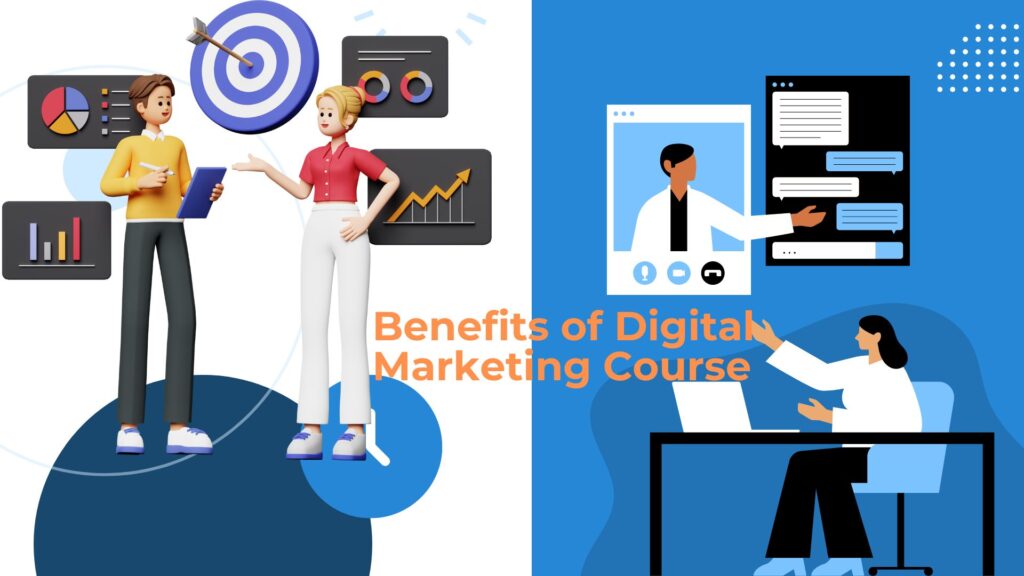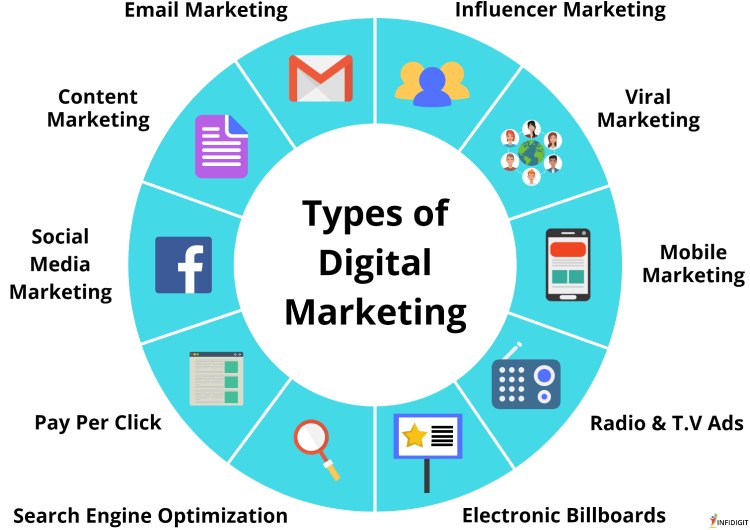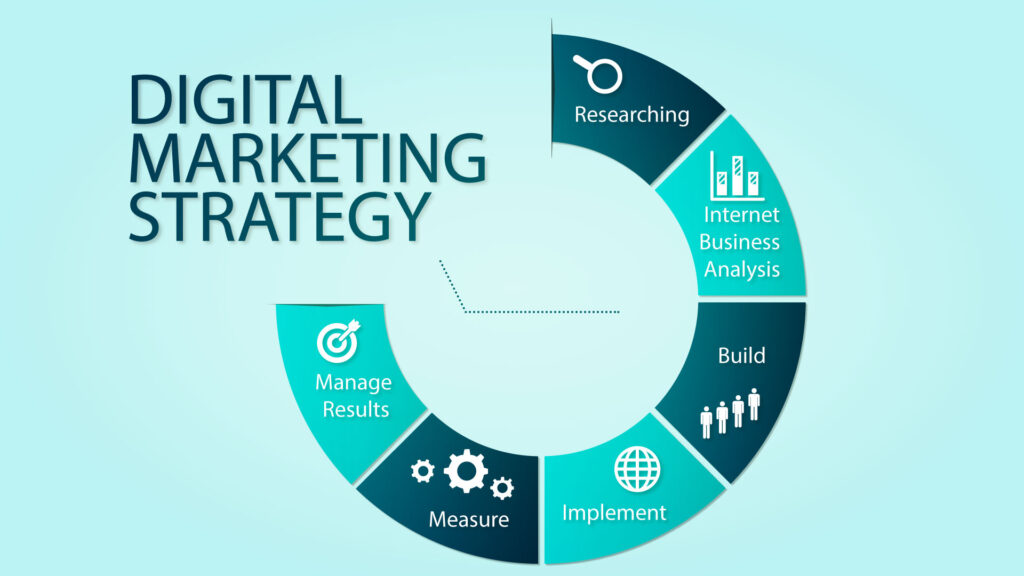What is Digital Marketing?
At its core, Digital Marketing encompasses an array of strategies and tactics designed to leverage digital channels in reaching and engaging target audiences. Whether it’s crafting compelling social media campaigns, optimizing website content for search engines, or delivering personalized email newsletters, digital marketing spans a vast and diverse landscape.

What are the Benefits of Digital Marketing Course?
In today’s Digital age, businesses and individuals alike are recognizing the value of online presence and marketing strategies. Enrolling in The Benefits of Digital Marketing Course can provide a wealth of knowledge and skills that are essential for success in this field. Here are The Benefits of Digital Marketing Course:
1. Comprehensive Understanding of Digital Marketing
One of the primary The Benefits of Digital Marketing Course is that it provides a comprehensive understanding of the various aspects of digital marketing. Students learn about SEO, content marketing, social media strategies, email marketing, PPC advertising, and more. This broad knowledge base equips individuals with the tools needed to create and implement effective marketing strategies.
2. Industry-Relevant Skills
The Benefits of Digital Marketing Course include gaining industry-relevant skills that are highly sought after by employers. These courses often cover the latest trends and techniques in digital marketing, ensuring that students are up-to-date with current practices. Skills such as data analysis, content creation, and online campaign management are essential for a successful career in digital marketing.
3. Hands-On Experience
The Benefit of Digital Marketing Course is the hands-on experience it provides. Many courses incorporate practical assignments and real-world projects, allowing students to apply what they’ve learned in a controlled environment. This practical experience is invaluable when transitioning into the workforce, as it demonstrates a proven ability to execute digital marketing strategies.
4. Enhanced Employability
The Benefits of Digital Marketing Course extend to enhanced employability. As businesses increasingly prioritize their online presence, the demand for skilled digital marketers is on the rise. Completing a recognized digital marketing course can significantly boost a candidate’s resume, making them more attractive to potential employers.
5. Flexibility and Convenience
Many The Benefits of Digital Marketing Courses offer flexible learning options, including online classes and self-paced learning modules. This flexibility allows students to balance their studies with other commitments such as work or family. The convenience of online learning means that anyone can access quality education regardless of their location.
6. Networking Opportunities
One of the less obvious The Benefits of Digital Marketing Course is the networking opportunities it provides. Students often have the chance to connect with industry professionals, instructors, and peers. These connections can lead to valuable professional relationships, internships, and job opportunities in the future.
7. Certification and Credibility
Completing The Benefits of Digital Marketing Course often results in certification, which adds credibility to one’s professional profile. Certified digital marketers are seen as more reliable and knowledgeable, making it easier to gain the trust of employers and clients. Certification also demonstrates a commitment to professional development.
8. Career Advancement
The Benefits of a Digital Marketing Course are significant for those looking to advance their careers. Whether you are a recent graduate or a professional seeking to change careers, having digital marketing expertise opens up a wide range of job opportunities. Roles such as SEO specialist, social media manager, and digital marketing strategist are just a few examples of positions available to skilled marketers.
9. Entrepreneurial Skills
For aspiring entrepreneurs, The Benefits of a Digital Marketing Course are immense. Understanding how to market products or services online is crucial for any startup. The skills acquired in a digital marketing course can help entrepreneurs effectively promote their businesses, attract customers, and achieve sustainable growth.
10. Stay Ahead of the Competition
In the ever-evolving digital landscape, staying ahead of the competition is crucial. One of the key The Benefits of Digital Marketing Course is that it keeps you informed about the latest trends and technologies. This knowledge allows marketers to implement cutting-edge strategies and maintain a competitive edge in the industry.

10 Benefits of Digital Marketing
The 10 Benefits of a Digital Marketing Course:- Digital marketing is an ever-evolving field, and gaining expertise in it through a comprehensive course offers numerous benefits. Here are some of the key advantages:
1. Flexibility Digital marketing courses often offer flexible schedules, allowing you to learn at your own pace. Whether you’re a working professional, a student, or a stay-at-home parent, you can fit the coursework around your other commitments.
2. Improve Career Prospects Completing a digital marketing course can significantly boost your career prospects. It equips you with the latest industry knowledge and practical skills that are highly sought after by employers across various sectors.
3. Enhanced Digital Marketing Knowledge A structured course provides a deep dive into the myriad aspects of digital marketing, from SEO and content marketing to social media strategies and analytics. This comprehensive understanding is crucial for effectively navigating the digital landscape.
4. Cost-effective Compared to traditional degrees, digital marketing courses are often more affordable. They provide excellent value for money by offering extensive learning opportunities at a fraction of the cost of a university education.
5. Competitive Salaries With the rising demand for digital marketing professionals, salaries in this field are highly competitive. Specialized skills and knowledge can lead to lucrative job offers and rapid career advancement.

6. Entrepreneurship Digital marketing skills are invaluable for entrepreneurs. They enable you to effectively promote your business, reach a wider audience, and generate more sales, giving you a competitive edge in the market.
7. Increased ROI Digital marketing strategies often provide a higher return on investment (ROI) compared to traditional marketing methods. With the right skills, you can optimize campaigns to ensure maximum efficiency and effectiveness.
8. New Product Development Digital marketing knowledge helps in the successful launch of new products. Understanding market trends and consumer behavior allows you to develop and promote products that meet customer needs and preferences.
9. Accurate Results Digital marketing tools offer precise analytics and metrics, allowing you to measure the success of your campaigns accurately. This data-driven approach helps in making informed decisions and optimizing strategies.
10. Diverse Career Opportunities The digital marketing field offers a wide range of career paths, from SEO specialists and content managers to social media strategists and PPC experts. This diversity ensures that you can find a role that aligns with your interests and strengths.
Benefits of Digital Marketing for Students
In today’s rapidly evolving digital landscape, the benefits of digital marketing for students are immense and multifaceted. As businesses and organizations increasingly rely on online platforms to reach their audiences, students equipped with digital marketing skills are finding themselves at a distinct advantage. Here’s a look at why digital marketing is an essential tool for students and how it can shape their future careers.
1. Enhanced Employability
One of the primary benefits of digital marketing for students is the significant boost it provides to their employability. With the job market becoming more competitive, possessing digital marketing skills can set students apart from their peers. Companies across various industries seek professionals who can effectively navigate the digital realm to promote their products and services. Students who understand SEO, social media marketing, content creation, and analytics are highly valued.
2. Practical Experience and Skill Development
Digital marketing offers students a practical, hands-on learning experience. Unlike theoretical subjects, digital marketing involves real-world applications. Students can work on actual campaigns, analyze market trends, and adjust strategies in real-time. This practical exposure helps in developing critical thinking, creativity, and analytical skills—key competencies for any career.
3. Entrepreneurial Opportunities
For students with an entrepreneurial spirit, digital marketing knowledge opens up a world of opportunities. Understanding how to market products or services online is crucial for any startup. Students can launch their own businesses or freelance as digital marketers, leveraging social media, email marketing, and SEO to grow their ventures. This entrepreneurial experience not only provides financial benefits but also teaches valuable business management skills.
4. Cost-Effective Learning
Digital marketing is one of the most cost-effective skills to acquire. There are numerous free and low-cost resources available online, including tutorials, courses, webinars, and eBooks. Platforms like Google, HubSpot, and Coursera offer certifications that can enhance a student’s resume without breaking the bank. This accessibility ensures that all students, regardless of their financial situation, can learn and excel in digital marketing.
5. Flexibility and Remote Work Opportunities
One of the attractive benefits of digital marketing for students is the flexibility it offers. Many digital marketing tasks can be performed remotely, allowing students to work from anywhere. This flexibility is particularly advantageous for those balancing studies, part-time jobs, or internships. Moreover, the growing trend of remote work in the industry means students can start building their careers without being confined to a specific geographical location.
6. Staying Ahead in a Digital World
In an era where digital presence is paramount, understanding digital marketing ensures that students stay ahead of the curve. They learn how to build and manage an online presence, which is not only beneficial for personal branding but also for any future roles in marketing, communication, or business development. The ability to adapt to digital trends and tools is a valuable asset in any professional field.
7. Interdisciplinary Applications
Digital marketing skills are not limited to traditional marketing roles. They have interdisciplinary applications across various fields such as journalism, public relations, education, and more. For instance, a student in journalism can use digital marketing to promote their articles and reach a wider audience. Similarly, education majors can learn to create engaging online content and educational campaigns.

The Foundations of Digital Marketing
The Foundations of Digital Marketing The fundamental principle of digital marketing mirrors that of its traditional counterpart – connecting with the right audience, at the right time, and in the right place. However, what sets digital marketing apart is its unparalleled ability to target, measure, and optimize marketing efforts in real-time. Through sophisticated analytics tools, marketers can gain invaluable insights into consumer behavior, preferences, and interactions, enabling them to refine their strategies for maximum impact.
The Pillars of Digital Marketing?
1.Search Engine Optimization (SEO): Enhancing a website’s visibility in search engine results pages (SERPs) through organic techniques such as keyword optimization, content creation, and link building.
2.Content Marketing: Creating and distributing valuable, relevant content to attract and engage a target audience, ultimately driving profitable customer action.
3.Social Media Marketing: Leveraging social media platforms to build brand awareness, foster customer relationships, and drive website traffic and conversions.

4.Email Marketing: Sending targeted, personalized email campaigns to nurture leads, promote products or services, and drive customer engagement and loyalty.
5.Pay-Per-Click (PPC) Advertising: Placing targeted ads on search engines and social media platforms, paying only when users click on the ad, to drive traffic and conversions.
6.Affiliate Marketing: Partnering with third-party websites or individuals to promote products or services in exchange for a commission on sales generated through their referrals.
The Ever-Evolving Landscape
The Ever-Evolving Landscape Digital marketing is a dynamic and ever-evolving field, shaped by advancements in technology, changes in consumer behavior, and shifts in industry trends. From the rise of voice search and artificial intelligence to the growing importance of video content and influencer marketing, staying ahead in the digital marketing game requires continuous learning, adaptation, and innovation.
Why Digital Marketing Matters
Digital Marketing Matters In today’s hyper-connected world, digital marketing is not just a choice but a necessity for businesses looking to thrive and succeed in the digital age. By embracing digital channels, brands can amplify their reach, engage with their audience on a deeper level, and drive tangible results that impact their bottom line.
The Top Benefits of Digital Marketing Benefits of Digital Marketing In an era where the digital landscape dominates our daily lives, leveraging digital marketing has become imperative for businesses aiming to thrive in the competitive market. From startups to established corporations, the benefits of digital marketing are undeniable, reshaping how companies connect with their audience and drive growth. Here’s a breakdown of the top advantages.
1.Global Reach: Unlike traditional marketing constrained by geographical boundaries, digital marketing transcends borders, offering businesses unparalleled global reach. Whether you’re a small local enterprise or a multinational corporation, the internet provides a platform to engage with audiences worldwide, opening avenues for expansion and diversification.
2.Local Reach: While digital marketing facilitates global outreach, it also empowers businesses to enhance local visibility. Through targeted strategies like local SEO and geo-targeted ads, companies can effectively reach nearby customers, fostering community engagement and driving foot traffic to brick-and-mortar establishments.
3.Cost-effectiveness: One of the most significant advantages of digital marketing lies in its cost-effectiveness. Unlike traditional methods that often require substantial financial investments, digital marketing offers affordable solutions tailored to businesses of all sizes. Whether it’s SEO, social media, or content marketing, digital platforms provide accessible avenues for promotion, leveling the playing field for startups and established brands alike.

4.Brand Awareness: Digital marketing serves as a potent tool for building brand awareness and recognition. Through strategic online campaigns, businesses can elevate their visibility, captivate audiences, and forge meaningful connections with customers, laying the foundation for sustainable growth and loyalty.
5.Effective Targeting: Digital marketing empowers businesses with precise targeting capabilities, enabling them to reach the right audience with tailored messages. By harnessing data analytics and insights, companies can refine their campaigns, optimize conversion rates, and anticipate evolving consumer needs, ensuring maximum ROI and competitiveness in the market.
6.Multiple Strategies: From B2B enterprises to B2C retailers, digital marketing offers a diverse array of strategies to suit different business objectives and industries. Whether it’s content marketing, PPC advertising, or email campaigns, businesses can customize their approach to align with their unique goals, constantly evolving and refining strategies to adapt to changing market dynamics.
7.Multiple Content Types: In the realm of digital marketing, content reigns supreme, offering businesses a myriad of formats to showcase their brand and engage with audiences. From blog posts and videos to infographics and podcasts, the digital landscape provides endless possibilities for creativity and innovation, allowing brands to stay relevant and resonate with consumers across various platforms.
How to Create a Digital Marketing Strategy
How to Create a Digital Marketing Strategy No two digital marketing campaigns are the same. There are many approaches and tactics to consider, and it’s up to you to choose how much you invest in them. That said, most digital marketing strategies tend to follow similar planning and deployment processes. Here’s how to build one:
1. Set Your Marketing Goals Start by defining clear, actionable goals that align with your broader business objectives. These goals will guide your strategy, helping you stay focused and measure success. Examples: Rank in the top five Google search results for a specific keyword by June 2025. Increase website traffic by 25% over the next three months. Build an email list of 1,000 subscribers before the end of 2024.
2.Understanding who your target audience is crucial for effective marketing. Create Buyer Personas: Develop profiles that include demographic, psychographic, and behavioral information about your ideal customers. Conduct Market Research: Gather data through surveys, interviews, and analytics tools to understand your audience’s needs and preferences. Analyze Competitors: Study your competitors to identify gaps and opportunities in the market. Segment Your Audience: Divide your audience into smaller, more manageable groups for targeted marketing.

3. Choose Your Digital Marketing Channels Select the most effective channels to reach your audience. Each channel has its strengths and should be chosen based on your audience’s preferences and your business goals. SEO (Search Engine Optimization): Optimize your website to rank higher in search engine results and attract organic traffic. Social Media Marketing: Utilize platforms like Facebook, Instagram, Twitter, and LinkedIn to connect with your audience and promote your brand. Email Marketing: Send targeted messages to your email list to nurture leads and drive conversions. PPC (Pay-Per-Click) Advertising: Use paid ads on search engines and social media to drive traffic and conversions.
4. Develop a Content Strategy A well-defined content strategy ensures that you produce and distribute content that resonates with your audience. Content Types: Decide on the types of content to create, such as blog posts, videos, infographics, eBooks, and webinars. Content Calendar: Plan your content production and publication schedule to maintain consistency. SEO Integration: Optimize your content for search engines to enhance visibility and attract organic traffic. Distribution Plan: Outline how and where you will distribute your content, leveraging social media, email newsletters, and third-party sites.
5. Implement and Monitor Your Strategy Execution is key. Implement your strategy with a clear plan, using the right tools and processes to track progress. Assign Roles and Responsibilities: Ensure every team member knows their tasks and deadlines. Utilize Marketing Tools: Use project management, social media scheduling, email marketing, and analytics tools to streamline your efforts. Track KPIs (Key Performance Indicators): Monitor metrics such as website traffic, conversion rates, social media engagement, and email open rates. Analyze and Adjust: Regularly review performance data to identify successes and areas for improvement. Be prepared to adjust your strategy as needed.
6.Evaluate and Optimize Continuous evaluation and optimization are essential for maintaining an effective digital marketing strategy. Conduct Regular Audits: Periodically review your digital marketing activities to ensure they align with your goals and audience needs. Stay Updated: Keep abreast of industry trends and changes in digital marketing platforms. Test and Experiment: Use A/B testing and other methods to experiment with different approaches and refine your strategy based on the results. Gather Feedback: Solicit feedback from your audience and team to gain insights into how your strategy can be improved.
